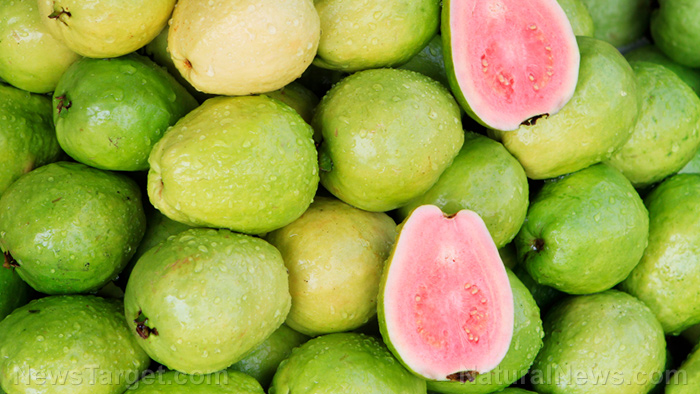by Michelle Simmons
In Thailand, there are a lot of fruits available. Yam bean (Pachyrhizus erosus, L.) and guava (Psidium guajava, L.) are two of the most commonly consumed fruits in Thailand. In a study published in the journal BMC Complementary and Alternative Medicine, researchers from Mahidol University in Thailand evaluated the heart health benefits of yam bean root juice and guava fruit juice in healthy people.
For the study, the researchers recruited 30 healthy participants who were then divided into three groups. Every group was randomly assigned to drink 500 milliliters of freshly made yam bean root juice, guava fruit juice, or water. Yam bean and guava are available throughout the year and are not expensive, thus, consumable by all population. (Related: 13 Medicinal Benefits of Guava and Guava Leaves.)
In addition, the researchers assessed the systemic nitrate and nitrite concentrations, heart rate, systolic and diastolic blood pressure, serum K+ concentrations, ex vivo platelet aggregation, and plasma cyclic guanosine monophosphate (cGMP) concentrations at the beginning of the study and at different time points after the consumption of the drinks.
The researchers found that both yam bean root and guava fruit juices demonstrated inhibitory effects against collagen-induced platelet aggregation. The yam bean root juice had a significant amount of dietary nitrate which was absorbed and further transformed to nitrite in the body after drinking the juice.
Participants who consumed yam bean root juice experienced a reduction in diastolic blood pressure. Meanwhile, those who consumed guava juice not only had a reduction in diastolic blood pressure but only in systolic blood pressure and heart rate.
Based on the findings of the study, the researchers concluded that the consumption of yam bean root juice or guava fruit juice could potentially enhance cardiovascular health due to their roles in platelet inhibition and blood pressure reduction.
Other fruits and vegetables to juice for heart health
In the U.S., approximately 610,000 people die because of heart disease each year – which is one in every four deaths, according to the Centers for Disease Control and Prevention (CDC). Furthermore, heart disease is the leading cause of death for both men and women in the U.S.
Studies have proven that a plant-based diet rich in anti-inflammatory compounds and nutrients boosts heart health. These compounds and nutrients reduce inflammation inside the vessel walls and protect the cells from free radical damage. Most experts suggest that consuming five to seven servings of fruits and vegetables can help in the prevention of heart disease. One of the best ways to consume fruits and vegetables is through juicing.
Unlike smoothies, which generally contain more fiber and more fruit, fresh juices can be filled with dark leafy greens and many red, orange, and/or purple vegetables and fruits to help maximize the nutrients in every glass. Here are other fruits and vegetables that can be juiced and consumed on a regular basis to prevent heart disease:
– Beets – Research revealed that beet juice lowered blood pressure six hours after drinking the juice.
– Celery – The juice of celery contains anti-hypertensive properties because of phthalides. These naturally-occurring compounds relax the tissues of the artery walls to enhance blood flow and lower blood pressure.
– Cranberries – Cranberries are rich in polyphenols which help reduce heart disease risk. Research has shown that regular consumption of cranberry juice decreased arterial stiffness, which occurs as a result of atherosclerosis.
– Garlic – Garlic juice may not be palatable but it is rich in substances that prevent blood platelets from clumping, which lowers the chance of fatal blood clots from forming and helps improve circulation. Garlic also helps prevent atherosclerosis, a leading cause of heart attacks and strokes.
– Red grapes – Red grape juice protects against oxidized LDL cholesterol, which can cause hardened arteries. In addition, red grapes contain resveratrol which helps prevent platelets from sticking together.
– Pomegranate – Pomegranate juice can lower blood pressure. It is also packed with anti-inflammatory antioxidants that will protect the cardiovascular system from tissue damage and inflammation. (Natural News).



